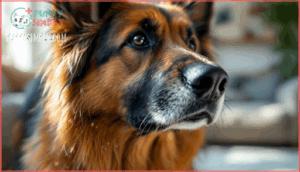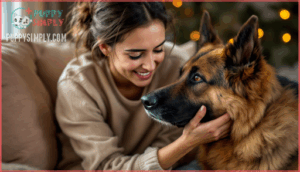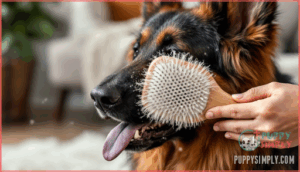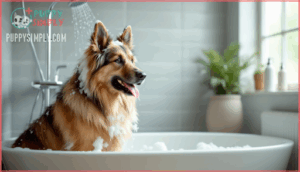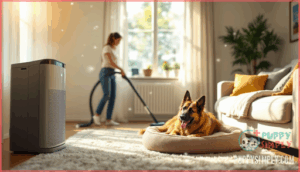This site is supported by our readers. We may earn a commission, at no cost to you, if you purchase through links.
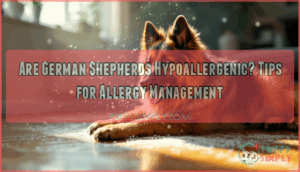
No dog breed is truly hypoallergenic, and German Shepherds rank among the higher allergen producers due to their continuous shedding cycle.
If you’re committed to keeping your German Shepherd despite allergies, strategic grooming routines, environmental controls, and medical interventions can greatly reduce your exposure and help you manage symptoms without rehoming your dog.
Table Of Contents
- Key Takeaways
- Are German Shepherds Hypoallergenic?
- Why Do German Shepherds Trigger Allergies?
- Common Allergy Symptoms in Dog Owners
- Tips to Reduce Allergens From German Shepherds
- Managing Allergies While Living With a German Shepherd
- Medical and Dietary Strategies for Allergy Relief
- Best Alternatives for Allergy-Prone Families
- Frequently Asked Questions (FAQs)
- What types of German Shepherd coats shed the least?
- Is there variation in dander production between individual German Shepherds?
- Can you train a German Shepherd not to trigger allergies as much?
- How often should you bathe a German Shepherd if you have allergies?
- Can German Shepherds live with mild allergy sufferers?
- Are puppies less allergenic than adult German Shepherds?
- How long before allergy symptoms improve with treatment?
- Conclusion
Key Takeaways
- German Shepherds aren’t hypoallergenic—they rank among the highest allergen producers due to their double coat, constant shedding, and proteins in dander, saliva, and urine that trigger reactions in sensitive individuals.
- Daily brushing, weekly bathing with hypoallergenic shampoo, HEPA filters, and strict cleaning routines can reduce airborne allergens by up to 84%, making symptoms more manageable without eliminating them entirely.
- Medical interventions like antihistamines provide relief within 30 minutes, while immunotherapy (allergy shots or tablets) can reduce allergic reactions by 60-80% after one year of consistent treatment.
- If you need a similar breed with lower allergen levels, consider Giant Schnauzers, Portuguese Water Dogs, or Soft-Coated Wheaten Terriers—they offer comparable temperament and size with significantly less dander production.
Are German Shepherds Hypoallergenic?
If you’re considering a German Shepherd but worry about allergies, you need to know the facts. The term "hypoallergenic" gets thrown around a lot, but it doesn’t mean what most people think.
Let’s look at what this label actually means, how German Shepherds measure up, and what the science says about allergenic breeds.
What “Hypoallergenic” Really Means
The term "hypoallergenic" often creates confusion, because it doesn’t mean a dog is completely allergen-free. Instead, it means the breed produces fewer allergens than others, which can reduce symptoms for allergy sufferers.
All dogs create allergenic proteins in their dander, saliva, and urine, but some breeds release less into your home.
This breed variability matters when you’re managing dog allergies, especially with German Shepherds, which produce significant allergen levels.
Allergen Levels in German Shepherds
German Shepherds rank among the higher allergen producers compared to many other breeds, thanks to their thick double coat and year-round shedding pattern. Their allergen levels stem from multiple sources:
- Dander production: Dead skin cells constantly flake off, spreading proteins throughout your home
- Saliva allergens: Licking their fur transfers proteins directly onto their coat
- Urine proteins: These allergens stick to fur and surfaces during bathroom routines
- Shedding frequency: German Shepherd shedding happens daily, releasing dander into the air
- Allergen variation: Individual dogs produce different protein amounts, affecting your reaction severity
This combination makes German Shepherds particularly challenging for allergy sufferers.
Scientific Evidence on Allergenic Breeds
Research shows that breed allergen production doesn’t follow expected patterns. A 2012 study of 173 homes found no difference in Can f 1 allergen levels between so-called hypoallergenic breeds and standard breeds. Surprisingly, hypoallergenic breeds showed higher fur allergen concentrations (226 μg/g) versus non-hypoallergenic breeds (77 μg/g).
Expert consensus from allergy organizations confirms that hypoallergenic breed claims lack scientific support. While some promote certain breeds as less allergenic, there’s no scientific evidence supporting the existence of truly hypoallergenic dogs.
| Study Factor | Hypoallergenic Breeds | Non-Hypoallergenic Breeds |
|---|---|---|
| Can f 1 levels | No significant difference | No significant difference |
| Fur allergens | 226 μg/g average | 77 μg/g average |
| Airborne allergens | Similar concentrations | Similar concentrations |
| Clinical reactions | 64% triggered symptoms | Similar reaction rates |
Why Do German Shepherds Trigger Allergies?
If you’ve ever spent time around a German Shepherd, you know they’re remarkable dogs—but they can make your allergies flare up in a hurry. The culprit isn’t the fur itself, but what’s hiding in it.
Let’s break down the three main ways German Shepherds spread allergens throughout your home.
Proteins in Dander, Saliva, and Urine
You mightn’t realize that allergens don’t just hide in dog dander—they’re everywhere your German Shepherd leaves a mark. When your dog licks its coat, allergenic proteins from saliva bind to hair and dead skin cells, creating a triple threat:
- Dander protein concentrations can reach over 69 µg/g in homes with dogs, far exceeding sensitization thresholds
- Saliva allergen diversity includes at least 12 different IgE-binding proteins that trigger immune responses
- Urinary allergen variability adds prostatic kallikrein (Can f 5), particularly from male dogs
These cross-source interactions mean you’re exposed to multiple allergenic proteins simultaneously, amplifying your body’s reaction and making allergen transport dynamics throughout your home nearly unavoidable. Studies have shown that dog allergens are universally present in US homes.
Impact of Double Coat and Shedding
Your German Shepherd’s luxurious double coat—designed to protect them from harsh weather—works like a living allergen factory, constantly shedding microscopic particles into every corner of your home.
This coat density means dander production runs high year-round, with shedding frequency peaking twice annually during seasonal blowouts.
Managing German Shepherd allergies requires understanding that grooming impact can reduce allergen distribution temporarily, but you can’t eliminate the constant release of dog dander from this breed’s naturally heavy-shedding double coat.
How Allergens Spread in The Home
Once allergens leave your dog’s coat, they don’t stay put—they hitch rides on air currents, settle into fabrics, and cling to surfaces throughout every room you share. Dander distribution happens fast because these airborne particles are microscopic and lightweight.
Your home environment becomes a reservoir for pet dander, with allergen accumulation building on carpets, upholstery, and bedding. Ventilation impact can either dilute or concentrate these surface allergens, depending on your airflow patterns.
Common Allergy Symptoms in Dog Owners
If you share your home with a German Shepherd, you’ll want to recognize what an allergic reaction looks like.
Dog allergies can show up in different ways, and symptoms can range from mild to severe. Let’s walk through the signs your body might be reacting to your four-legged companion.
Respiratory and Skin Reactions
When you breathe in dog dander or touch your German Shepherd’s fur, your immune system can mistake harmless proteins for dangerous invaders, triggering a cascade of uncomfortable reactions throughout your body. You might notice breathing difficulties, sneezing, or congestion as allergens irritate your nasal passages.
Skin rashes, hives outbreak, and eye irritation are common too. These allergy symptoms happen when skin cells carrying proteins make contact with you, sparking an allergic reaction.
Severity and Frequency of Symptoms
Allergy symptoms don’t hit everyone the same way—some people sneeze once around a German Shepherd, while others find themselves reaching for tissues and eye drops every single day. Symptom intensity depends on your allergen threshold and how much exposure you get. Reaction time varies too, with chronic symptoms developing after repeated contact.
Your dog allergy symptoms can change based on:
- Symptom variation throughout seasons when shedding increases
- Allergy triggers like pollen mixing with dander, making things worse
- Allergen threshold shifts as your immune system responds differently over time
Reducing allergy symptoms requires understanding your own reaction patterns.
Identifying an Allergic Reaction
Pinpointing whether you’re actually allergic to your German Shepherd—or just dealing with seasonal sniffles—takes a bit of detective work. Track onset timing after dog contact, watch for symptom variation in different rooms, and note your immune response patterns. Diagnostic methods like skin prick tests or blood work confirm allergic reactions, while severity assessment helps measure your allergen threshold.
| Sign | Dog Allergy | Other Causes |
|---|---|---|
| Timing | Within minutes of contact | Random or seasonal |
| Location | Worse near dog areas | Consistent everywhere |
| Triggers | Petting, grooming, cleaning | Pollen, dust, weather |
| Duration | Improves away from dog | Persists regardless |
| Cross-reactivity | May worsen with other pets | Isolated to one trigger |
If allergy symptoms persist despite distance from your dog, consult an allergist for proper diagnosis.
Tips to Reduce Allergens From German Shepherds
If you’re committed to keeping your German Shepherd despite allergies, you can take steps to lower allergen levels in your home. These methods won’t eliminate allergens completely, but they can make living with your dog more comfortable.
Here are some proven strategies that reduce dander and other triggers.
Daily Brushing and Grooming
Brushing your German Shepherd every day isn’t just about keeping your floors clean—it’s one of the most effective ways to trap loose fur and dander before they drift into the air you breathe. Use a wire-bristle slicker brush designed for double coats to capture allergens at the source.
Here’s what daily grooming does for allergy sufferers:
- Removes up to 70% of loose undercoat before it sheds indoors
- Distributes natural oils that strengthen coat health and reduce flaking
- Cuts airborne dander that triggers sneezing and itchy eyes
- Prevents matting that traps saliva and dead skin cells
- Reduces need for professional grooming visits while maintaining shedding control
Weekly Bathing Techniques
A good bath once a week strips away the allergen buildup that daily brushing can’t fully reach, cutting dander levels by up to 84% on your dog’s coat and skin.
Use a hypoallergenic dog shampoo formulated for sensitive skin, and rinse with lukewarm water to avoid irritation. Thoroughly towel-dry or use a pet dryer to prevent moisture from trapping allergens in the undercoat.
This bathing frequency balances effective allergy management without drying out your German Shepherd’s skin.
Using HEPA Filters and Air Purifiers
Even with regular baths, airborne allergens continue to float through your home, which is where HEPA filters and air purifiers step in to trap particles your vacuum can’t catch. Choose an air purifier sized appropriately for your room, and place it where your dog spends the most time.
HEPA effectiveness depends on consistent filter maintenance, so replace filters every three to six months to keep airborne allergens under control.
Cleaning and Allergen Control Products
Beyond air filtration, you’ll need cleaning tools that tackle allergens where they settle. HEPA vacuums trap over 99% of dander on carpets and furniture, while enzyme cleaners break down proteins in saliva and urine. Anti-allergen sprays work best when combined with routine carpet cleaning and regular laundering of pet bedding with detergent, which removes more than 99.99% of allergens. These allergen control methods support your air purifier and HEPA filter efforts.
- Use HEPA vacuums weekly on all fabric surfaces
- Apply enzyme cleaners to floors and pet areas
- Wash bedding with laundry detergents for maximum dander control
Managing Allergies While Living With a German Shepherd
Living with a German Shepherd when you have allergies doesn’t mean you’re stuck with constant symptoms. You can set up your home in ways that reduce your exposure to allergens and make day-to-day life more comfortable.
Here are three practical steps that can help you manage allergens while keeping your German Shepherd as part of your family.
Restricting Dog Access in The Home
Setting boundaries in your home isn’t about banishing your dog, it’s about creating zones where allergen levels stay low enough for you to breathe easy. Establish pet-free zones like bedrooms, where you spend eight hours breathing recycled air. Designate areas with hardwood floors rather than carpet, which traps dander.
Use furniture covers in shared spaces and train your dog consistently to respect these boundaries. These allergen control methods protect child safety while maintaining your bond with your German Shepherd.
Keeping Dogs Off Furniture and Out of Bedrooms
Your furniture acts like a dander magnet, collecting and concentrating allergens in the exact spots where you relax and unwind.
Furniture covers and bedroom barriers provide practical home allergy control for allergy sufferers.
Train your German Shepherd to use elevated beds instead of sofas, creating pet-free zones that reduce allergy symptoms. Restricted zones protect your health without compromising your dog’s comfort.
Investing in Robot Vacuums and Cleaning Tools
Robot vacuums work around the clock to tackle the constant stream of fur and dander that German Shepherds leave behind, giving you a fighting chance against allergen buildup. HEPA filter vacuums capture microscopic particles that trigger symptoms, while cordless stick vacuums reach tight spaces where dander hides.
Effective cleaning strategies include:
- Running robot vacuums daily on carpet, hardwood, and tile
- Using deep cleaning tools weekly for upholstery
- Selecting allergen-reducing cleaners for surfaces
- Emptying vacuum canisters outside to prevent recontamination
Consistent cleaning minimizes your exposure considerably.
Medical and Dietary Strategies for Allergy Relief
If you’re still sneezing around your German Shepherd despite your best cleaning efforts, it’s time to look at medical and dietary options that can help. From allergy medications to coat-boosting nutrients, these strategies work from the inside out.
Here’s what you can do to manage symptoms and support your dog’s skin health at the same time.
Allergy Medications and Immunotherapy
If symptoms persist despite managing your dog’s environment, allergy medications and immunotherapy offer effective relief. Antihistamine options like cetirizine (Zyrtec) work within 30 minutes and last 24 hours, while nasal sprays such as fluticasone reduce inflammation in 80% of patients. Prescription meds like montelukast target persistent symptoms.
For long-term desensitization, immunotherapy types include weekly injections or sublingual tablets, reducing allergic reactions by 60–80% after one year. Notably, dog immunotherapy with allergen-specific treatments helps 60–70% of canines with skin allergies, potentially lowering allergen loads in your home.
Nutritional Support for Coat and Skin Health
A healthy coat starts from the inside out, and the right nutrients can dramatically reduce the shedding and dander that fuel your allergy symptoms.
Feed your German Shepherd high-quality dog food rich in protein sources and omega fatty acids, particularly fish oil, which strengthens skin health and minimizes flaking.
Supplement options like omega-3s improve coat types, while proper hydration aids skin barrier function and reduces allergen production.
Consulting an Allergist or Veterinarian
When daily grooming and dietary changes aren’t enough to control your symptoms, a professional consultation bridges the gap between managing and truly resolving the problem. An allergist can perform allergy testing to confirm breed sensitivity and rule out symptom overlap with other conditions.
Your healthcare provider will discuss allergy treatment options, including individual advice on allergy management strategies and immunotherapy.
A veterinarian consult helps improve your dog’s health, which directly impacts managing dog allergies in your home.
Best Alternatives for Allergy-Prone Families
If a German Shepherd isn’t the right match for your household, you don’t have to give up on finding a loyal, protective companion.
Several breeds offer similar traits with fewer allergens. Let’s look at some alternatives that might work better for your family.
Hypoallergenic Dog Breeds Similar to German Shepherds
If you’re drawn to German Shepherds but need hypoallergenic dog breeds, several Large Alternatives and Medium Breeds offer similar temperament with lower allergen levels in dogs. Consider these Shepherd Temperament matches for effective allergy management:
- Giant Schnauzer – Measures 60–70 cm, weighs 25–48 kg, with a wiry coat that minimizes shedding and allergen spread.
- Portuguese Water Dog – Features a curly, water-resistant coat limiting dander release, standing 43–57 cm tall.
- Soft-Coated Wheaten Terrier – Single silky coat sheds infrequently while maintaining playful energy similar to German Shepherds.
- Spanish Water Dog – Hypoallergenic herding breed with curly Coat Traits, weighing 14–22 kg, ideal for active families managing dog breeds and allergies.
These Small Options to large breeds can reduce allergy symptoms by 60–80% with proper grooming.
German Shepherd Mixes and Allergy Considerations
Mixing a German Shepherd with a hypoallergenic breed won’t guarantee an allergy-friendly dog, but it might lower your symptoms compared to a purebred. German Shepherd hybrids like Shepadoodles or Aussiedoodles show dander variation depending on which parent’s coat types they inherit.
Crossbreed shedding patterns remain unpredictable, so you’ll need to assess each designer breed individually. Before committing to German Shepherd hybrids and allergies management, spend time with the specific puppy to test your reaction to their dog dander.
Deciding if a German Shepherd is The Right Fit
If your heart is set on this breed, weigh your allergy severity against your willingness to maintain strict cleaning routines and medical management. Family considerations matter, especially when choosing a dog for allergy sufferers with varying sensitivity levels.
- Lifestyle compatibility: Daily grooming and weekly bathing require consistent time investment
- Financial implications: HEPA filters, medications, and immunotherapy add ongoing costs
- Commitment level: Managing dog allergies demands years of vigilant household control
- Alternative options: Low-shedding breeds offer easier paths for allergy-prone families
Frequently Asked Questions (FAQs)
What types of German Shepherd coats shed the least?
Short-coated German Shepherds shed less than their long-coated counterparts, though all German Shepherd breed characteristics include year-round shedding.
Grooming Impact and diet matters can influence how much dander and loose hair accumulate, but no coat types within this breed truly minimize shedding factors or allergies.
Is there variation in dander production between individual German Shepherds?
Yes, individual German Shepherds vary in dander production based on genetics, diet, age, and stress levels. Health status also affects allergen output, making some dogs less problematic for allergy sufferers than others.
Can you train a German Shepherd not to trigger allergies as much?
You can’t train a German Shepherd to produce fewer allergens through conduct modification. Training won’t reduce dander production or allergen levels.
However, you can teach your dog to accept regular grooming and bathing, which helps with allergen reduction and allergy management for allergy sufferers.
How often should you bathe a German Shepherd if you have allergies?
For allergy sufferers, bathing your German Shepherd weekly strikes the right balance—like hitting the ideal point between dander control and coat health.
This grooming routine can slash allergens by up to 84%, reducing allergy symptoms without stripping natural oils or drying out skin.
Can German Shepherds live with mild allergy sufferers?
Many people with mild allergies can successfully live with German Shepherds through lifestyle adjustments and gradual exposure.
Symptom thresholds vary, so tolerance building depends on your individual allergy management strategies and consistent allergen reduction efforts.
Are puppies less allergenic than adult German Shepherds?
German Shepherd puppies aren’t less allergenic than adults. Puppies produce the same dander, saliva allergens, and proteins that trigger allergy symptoms.
While their coat differences appear minimal early on, immune system development in allergy sufferers doesn’t reduce reactions to puppy allergen levels.
How long before allergy symptoms improve with treatment?
You can expect noticeable allergy relief within days to weeks when using allergy medications. Immunotherapy takes longer, often requiring three to six months before symptom severity decreases.
Lifestyle changes, like weekly bathing, improve allergy management gradually over several weeks.
Conclusion
The path forward won’t erase every sneeze or watery eye, but it can transform an overwhelming challenge into something manageable. When you combine consistent grooming, smart environmental adjustments, and medical support, German Shepherds can become hypoallergenic tips for families with allergies, shifting the focus from avoiding the problem to adapting to it.
Your German Shepherd’s companionship doesn’t have to come at the cost of your comfort—just a commitment to routine and realistic expectations about what’s truly possible.
- https://nativepet.com/blogs/health/are-german-shepherds-hypoallergenic
- https://figopetinsurance.com/blog/figo-german-shepherd-breed-guide
- https://www.sciencedirect.com/science/article/abs/pii/S0091674912007932
- https://aafa.org/allergies/types-of-allergies/pet-dog-cat-allergies/
- https://blog.petmade.com/german-shepherd-allergies/

